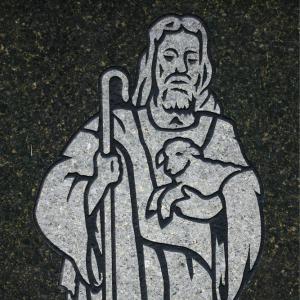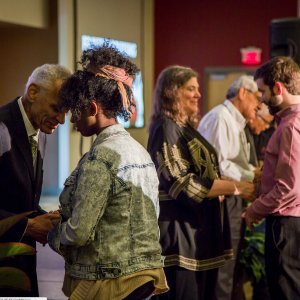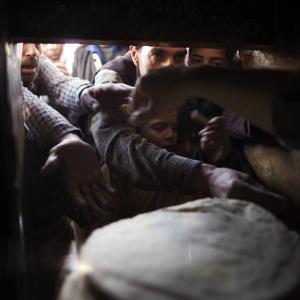Posts By This Author
Spotlight on the Summit 2015: The Elders
Much more than an event or a conference, The Summit was the growing edge of the beloved community — a gathering of emerging leaders with deep reach into neighborhoods and communities that are outcast but vibrant, marginalized but standing tall. It was creative and radically inclusive, bringing together people with very different experiences in the struggle for a more just and peaceful world.
To be included as an elder for such an event was a humbling and lovely experience — even more so to share that experience with such wise and faithful disciples as C.T. Vivian and Eliseo Medina, Heidi Neumark and Terry LeBlanc, Katherine Marshall and Roy Sano. I gained much more from each conversation than I could possibly have given!
When the Fighting Stops
What does it take to reintegrate combatants into society?
MARIE-LOUISE IS a 34-year-old single mother of three living in Bujumbura, the capital of the southeast African nation of Burundi. When she was 15 years old, she joined a rebel movement during the civil war in her country. “Following my demobilization,” she said, “my family welcomed me back warmly, but my neighbors did not think much of me. I still go around with a firearm ... Even my old friends find it hard to trust me. I have been branded because I am a female ex-combatant.”
Around the world, several armed conflicts are showing signs of winding down, at long last—there is renewed hope that the M23 rebel group in the Democratic Republic of Congo will stop fighting; the government and the FARC rebels in Colombia are making progress in negotiations toward peace after 65 years of civil war; the Philippine government and the Moro Islamic Liberation Front have agreed on a pact to end the fighting.
These events bring into focus the tremendous challenge of reintegrating former combatants into society. The process is especially difficult when they have been forced to commit atrocities against their own people. Think of Guatemala, Sierra Leone, and Cambodia, to name just a few.
The unique characteristics of each conflict make generalizations difficult, but in the stabilization and peace-building process, attention must be given to a complex of transitional justice issues, such as truth-telling and accountability for human rights violations. Other important factors include disarmament, the reintegration and rehabilitation of former combatants, security sector reform, economic justice and jobs, gender equality, the impact of the armed conflict on children (including child soldiers), and the political context.
Calling of the Shepherd
A prayer for the new pope to fulfill, in fresh ways, the promise of Vatican II.

(Timothy R. Nichols / Shutterstock)
WHEN POPE BENEDICT XVI unexpectedly announced his resignation in mid-February, many expressed admiration for the decision's honesty and humility, and much speculation followed about the reasons for it—and the consequences it would have.
As transition takes shape in the Vatican, Catholics around the world are commemorating the 50th anniversary of the Second Vatican Council, which took place from 1962 to 1965 and which redefined the church's relationship to the world. Vatican II's final document said: "This council can provide no more eloquent proof of its solidarity with, as well as its respect and love for the entire human family with which it is bound up, than by engaging with it in conversation about these various problems," referring in part to the "profound and rapid changes ... spreading by degrees around the whole world." Half a century ago, few could have predicted the dramatic changes that were to follow in science, technology, global integration, and social mores.
Catholics know that in the last 50 years the institutional church has been at the forefront of calls for a more just, compassionate, and sustainable world. Catholic social and ecological teaching is well developed and clearly articulated. The church has offered analysis and challenging proposals for financial reform, arms control, care for creation, and multilateral political structures of accountability in response to globalization.
We want the new pope to continue, deepen, and make much more visible—including to Catholics around the world—the church's prophetic work for social and economic justice, for environmental sustainability, and for wise, just, and inclusive peace. We want the new pope to engage the Islamic world, respectfully cooperating in response to orchestrated fear, enemy-making, and all forms of religious extremism. We want him to promote cultures of peace in a world that is increasingly violent. We want him to be open to new cosmological insights that are transforming human consciousness; shifting our understanding of earth community and of our planet's place in the vast, expanding universe; and maturing our reflections on the One who is Creator, Incarnation, and Spirit of love.
Worldwide Christians Fast for Peace in Syria
“Is not this the kind of fasting I have chosen: to lose the chains of injustice and untie the cords of the yoke, to set the oppressed free and break every yoke?” wrote the ancient prophet Isaiah (58:6). As Christians around the world enter the season of Lent, the challenge of the prophets is to not enter into empty rituals, but to recommit ourselves to fearless acts of justice.
This Lent Christians are standing in solidarity with Syrians by joining a rolling fast launched by Pax Christi International. The acute suffering of civilian communities in Syria has been made immeasurably worse by a shortage of bread, Syrian’s staple food, caused in part by the deliberate bombing of bakeries.
Open to anyone concerned about the anguish of local communities caught in Syria’s civil war, the campaign, called “Bread is Life – Fast for a Just Peace in Syria,” is a direct response to the fact that many Syrians feel abandoned by the rest of the world.
As the World Bank Turns
The Bank's new head has community-level anti-poverty expertise—and many challenges to face.
IN APRIL, THE World Bank’s executive directors selected Dr. Jim Yong Kim to serve as its president. Kim, whose five-year term begins in July, will be the first World Bank president whose primary experience is in community-level development. Most of his predecessors were bankers or politicians.
As a co-founder of Partners in Health, an international nonprofit dedicated to “a preferential option for the poor in health care,” and as a former director of the HIV/AIDS department of the World Health Organization, Kim has done groundbreaking work in delivering essential medicines for the treatment of AIDS to impoverished countries. He has a proven capacity for designing effective solutions to real problems. His election may well usher in a new culture at the World Bank—a culture that focuses not on economic growth that doesn’t trickle down, but on poverty reduction that is real.
For almost 70 years, the World Bank and the International Monetary Fund (IMF) have been major players in the global economy; the World Bank has 188 member countries, all of which must first be admitted to the IMF. In their many years of doing business, these institutions have reinvented themselves more than once. The World Bank’s focus has evolved from rebuilding Europe and Japan following World War II to supporting large-scale engineering projects in so-called “developing” countries; from emphasizing nutrition, population, and poverty in the 1970s to “adjusting” the economic policies of countries in the global South, beginning in the early 1980s.
As the negative impact of IMF policies and World Bank projects on impoverished people and their communities became increasingly evident, people of faith and grassroots groups around the world, particularly in the global South, began demanding change. They organized and advocated for greater transparency, accountability, and participation, insisting that failed strategies promoted and financed by the IMF and World Bank were related to hunger and other poverty-related problems, a growing rich-poor gap in almost every country, and environmental destruction.
Fighting Fire with Water
With U.S. troops now in Africa to escalate the fight against the Lord's Resistance Army, clergy in the region express concern.
Hubble, Hubble, Climate Trouble
For the past 30 years, through my work with Maryknoll and Pax Christi International, I've come to know grassroots communities around the world in situations of war and poverty. My mission focus base been largely international, but people, were in the "center of my screen." The environment, I thought, would have to wait.
A few weeks ago, I went with two of my grandchildren, Lauren (10) and Bobby (9), to see the documentary Hubble, which is about NASA's final shuttle expedition to repair a a broken part of the Hubble telescope. We watched in awe at the spectacular photos of the expanding universe. What an amazing sense these photos give of our own location as humans who are part of a larger earth community, who are part of a cosmos with which our own future is inextricably linked.
Terrible Twins
Hiroshima and Fukushima remind us that civilian and military nuclear technology go hand in hand.
Toward The Fullness of Life
Listening for God's voice at each new stage of life.
Broken Hearts and Deep Concern for Honduras
Zimbabwe: A Nation Waits
The patience of the people of Zimbabwe is absolutely incredible. They've been living a nightmare for years (inflation is so high that a second cup of coffee in half an hour can cost twice as much as the first) and they just endured a election campaign with serious instances of vote-rigging - from ghosts on the voters' registry to bribes offered for voting for the ruling party (ZANU-PF) - yet amazing hope was the dominant emotion as people went to the polls on March 29. The voting process was [...]
A Courageous Witness
Maryknoll Father Ron Hennessey was courageous, open to life, funny, welcoming, wise, a brilliant political strategist and holy - very holy. Simply put, he was one of the best human beings I have ever known.
A Few of My Favorite Things
She Who Is: The Mystery of God in Feminist Theological Discourse, by Elizabeth Johnson (Crossroad/Herder & Herder).
In the Chaos Everyone Was Equal
The United States will never be the same again; these are watershed days of irreversible change.






